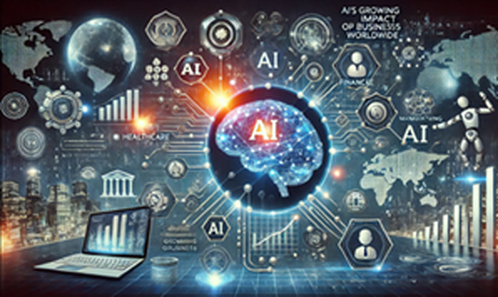AI Revolution in Business: 72% of Companies Now Using AI Regularly
AI’s Growing Impact on Businesses Worldwide
In the fast-paced world of business, Artificial Intelligence (AI) is no longer a futuristic concept—it’s a present-day necessity. According to a recent McKinsey study, AI usage in companies has grown from 50% to 72% in just a year, marking a significant shift in how organizations operate and compete in the digital economy.
Even more striking, 65% of business leaders now report using AI regularly, a sharp increase from just 33% last year. This surge underscores a fundamental shift in corporate strategies, where AI-driven tools are not just enhancing efficiency but also reshaping business models entirely.
💡 Industries Leading the AI Revolution
AI’s widespread adoption is transforming multiple industries, bringing efficiency, accuracy, and automation. Here’s how different sectors are leveraging AI for competitive advantage:
✅ Marketing & Advertising
- AI-driven predictive analytics allows businesses to anticipate consumer behavior, leading to highly targeted marketing campaigns.
- Advanced content personalization helps brands increase engagement and conversion rates.
✅ Customer Service & Retail
- AI-powered chatbots and virtual assistants handle millions of customer interactions daily, reducing response times and improving satisfaction.
- AI-based recommendation engines (like those used by Amazon & Netflix) enhance personalized shopping experiences.
✅ Finance & Banking
- AI helps in fraud detection, spotting irregular patterns in transactions faster than traditional systems.
- Automated trading algorithms make real-time financial decisions, increasing profitability and reducing risks.
✅ Manufacturing & Supply Chain
- AI-driven predictive maintenance reduces downtime and prevents costly machinery failures.
- Smart automation in warehouses and factories boosts production efficiency.
✅ Healthcare & Pharmaceuticals
- AI assists in diagnosing diseases, with some models outperforming human doctors in detecting illnesses like cancer.
- AI is speeding up drug discovery and development, reducing the time required to bring new medicines to market.
⚠️ Challenges & Risks of AI Adoption
Despite its incredible benefits, AI implementation comes with significant challenges, including:
🔴 Data Privacy & Security Risks – As AI relies on massive data sets, ensuring data protection and compliance with regulations (e.g., GDPR, CCPA) is a growing concern.
🔴 Bias & Ethical Issues – AI models can sometimes reflect unconscious biases present in training data, leading to unfair outcomes in hiring, lending, and law enforcement.
🔴 Job Displacement – Automation is replacing traditional jobs, requiring reskilling initiatives to help employees adapt to new AI-driven work environments.
🔴 Lack of Transparency – Many AI systems operate as "black boxes," making it difficult for businesses to fully understand or explain their decision-making processes.
🚀 The Future of AI in Business
With AI rapidly evolving, businesses that fail to adapt risk falling behind. Experts predict that by 2030, AI will contribute over $15 trillion to the global economy, solidifying its role as a key driver of business success.
🔹 Next Steps for Businesses:
- Invest in AI training & workforce development.
- Focus on ethical AI policies to ensure fairness and transparency.
- Strengthen cybersecurity measures to safeguard AI-driven operations.
As AI continues to reshape industries, companies must embrace innovation while managing risks responsibly to stay ahead in the competitive landscape.


